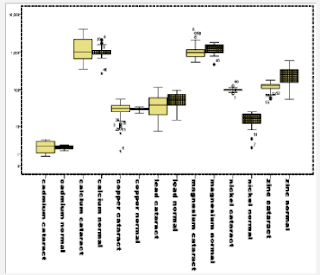Biological Samples as a Tool for Analysis of Metals in Serum of Cataract Patients-Current Trends in Biomedical Engineering & Biosciences-Juniper Publishers
JUNIPER PUBLISHERS-Current Trends in Biomedical Engineering & Biosciences
Biological Samples as a Tool for Analysis of Metals in Serum of Cataract Patients
Authored by Aima Iram Batool*
There is much evidence suggesting
that metallic elements may play a role in the formation or cure of human
cataract, a disease that is on the increase due to the growing percentage of
elderly persons in the world population.We have evaluated the levels of nickel,
copper, cadmium, calcium, magnesium, lead and zinc in hairs and nail samples of
cataractic subjects and compared these findings to the levels of healthy
controls.A group of patients diagnosed with cataract and a group of healthy
controls were chosen as subjects. Serum and hair samples were analyzed by
atomic absorption spectrophotometry. Results were statistically evaluated by
SPSS/PC software and student t-test.A significant difference was found in mean
concentrations of metallic elements in comparison of patient group to control
group (p < 0.05). Mean concentrations of nickel, copper, cadmium and calcium
were found significantly higher among cataractous patients at (p<0.05)
matched to healthy ones while concentrations of magnesium, zinc and lead were
significantly lower among group suffering from cecity. Significant difference
was observed among two groups under study regarding zinc, nickel, copper,
calcium, magnesium, and lead while for cadmium difference was statistically
non-significant. In spite of the fact that this study was carried out on a
relatively small sample population, the findings suggest some thought-provoking
questions, considering that there has been a good amount of controversy
regarding the status of these trace elements and their possible role in
cataractogenesis suggesting the need for further studies.
For More Articles in Current
Trends in Biomedical
Engineering & Biosciences Please Click on:
For More Open
Access Journals In Juniper Publishers Please Click on:

Comments
Post a Comment